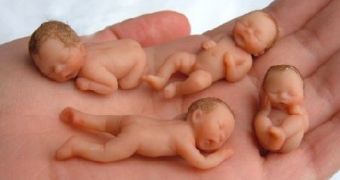The fact that contamination is a huge threat for your health is well known. It causes serious diseases: from cancer to sexual issues. But this is really unexpected: your baby will be a girl and not a boy! In countries like China and India, this can be a tragedy...
A new study at IntrAmericas Centre for Environment and Health revealed distorted birth sex ratio in some Canadian communities connected to dioxins, airborne pollutants, even if the cause of the contamination is located as much as 25 km (15.5 miles) away.
"Previous studies that linked dioxins with cancer and a gender imbalance focused on smaller distances, usually about 5 km," said lead researcher James Argo. The research was published in a journal of the American Chemical Society.
A previous research had found that dioxins boost both cancer rates and the number of newborn females and this study confirms this in Canada, finding that the risk area was much larger than previously believed.
In humans, there is a normal sex ratio of 103:100 (males to females): this means that 51 % of the newborn are boys and 49 % girls. By the time of puberty it is about 100:100, as boys are more vulnerable during childhood than girls.
But in the Canadian localities exposed to dioxin contamination, this report was severely turned upside down: 46 newborn males born to 54 females. The 65 dioxin sources in the atmosphere were oil refineries, electric power plants, paper mills, metal smelters, fuel and wood burning and especially large-scale burning of urban and medical waste.
"If you find an inverted sex ratio, and want to know what causes it, look for sources of dioxin. In every one of those cities where those industries are found ... there was a higher probability of female births to male births" said Argo.
The team gathered information from birth data and an inventory of pollution sources. Even if the main source of dioxin intoxication is the airborne one, the contaminant enters also water, soil and food (fish, meat and dairy products, as dioxins are highly soluble in fats) in very small amounts.
"Since more females were born in the 90 communities studied, more breast, uterine, cervical and ovarian cancers were observed among them than other forms of cancer," said Argo.

 14 DAY TRIAL //
14 DAY TRIAL //